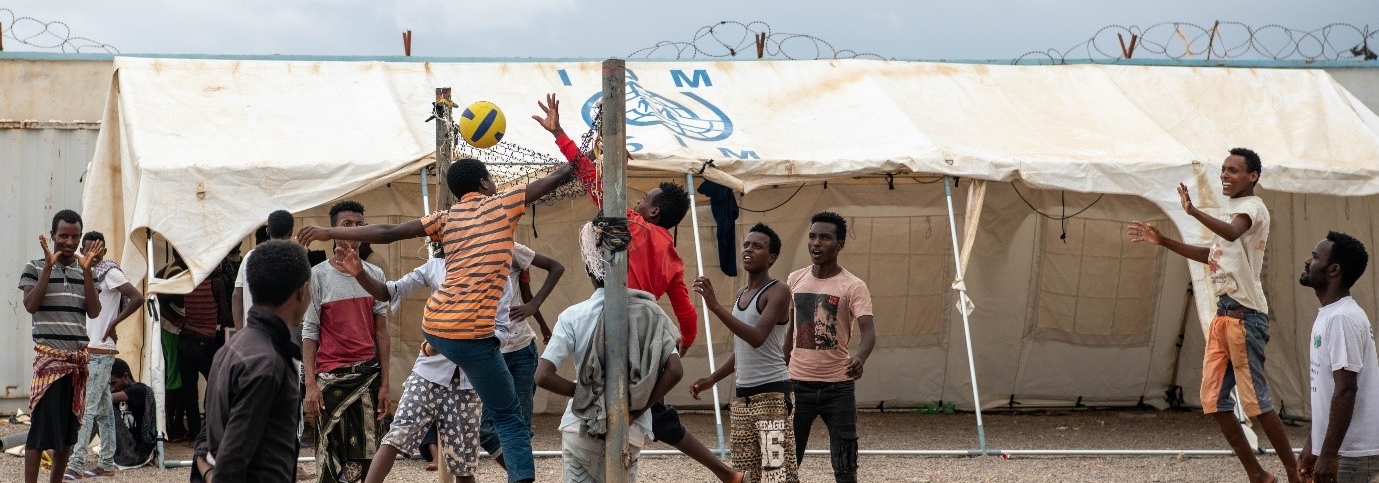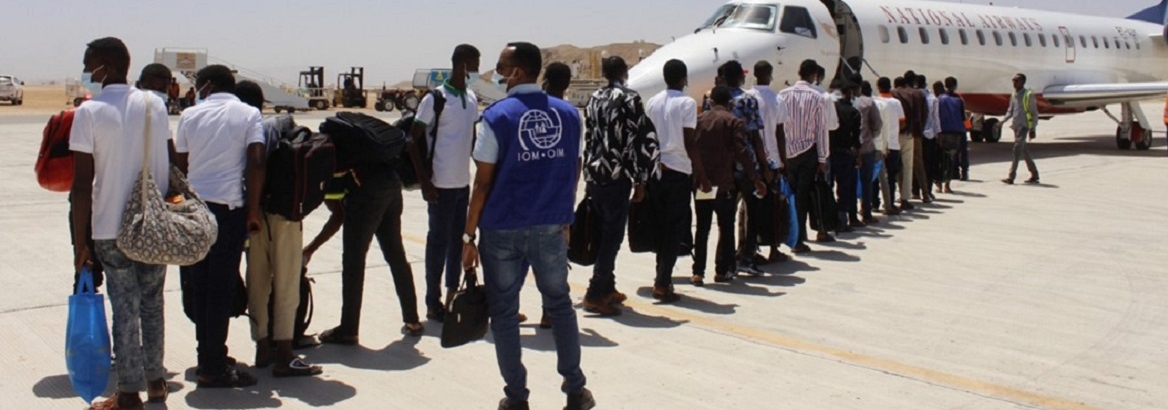IOM Vision
The Migrant Response Plan (MRP) for the Horn of Africa and Yemen includes urgent life-saving humanitarian and protection interventions to improve safe and dignified access to basic services for migrants and transit, host, and return communities while ensuring medium- to long-term actions aimed at addressing the drivers of migration. Within the broader inter-agency framework developed by IOM in coordination with 40 regional and country-level non-governmental and intergovernmental partners, IOM will support governments and other partners by strengthening their capacities for better migration management and providing sustainable socioeconomic infrastructure to support communities of origin, transit, and destination.
Objective
Saving lives and protecting people on the move
|
Assistance will be provided via multiple modalities to migrants and vulnerable populations along the migration route, specifically to vulnerable migrants, unaccompanied and separated children (UASC), gender-based violence (GBV) survivors, victims of trafficking and those at risk of trafficking, as well as communities along the route in which migrants transit or settle. IOM will also support the capacity-building of Governments to improve assistance to migrants and develop policies and laws to enhance migration management and migrants’ access to their rights. |
|
Migrants require assistance at key transit points, in the communities where they settle, and as they transit, often on foot and in remote desert areas, with minimal economic resources. Their most critical needs include water, food, and search and rescue in the Obock region (Djibouti). IOM will provide basic humanitarian assistance to vulnerable migrants, including stranded migrants, UASCs, GBV survivors and victims of human trafficking, including food and other humanitarian post-arrival support based on needs and vulnerability criteria. IOM will work closely with Migration Response Centres (MRCs), Migration Response Points, Community Centres, shelters and other service providers to:
|
|
Migrants persistently and progressively endure deteriorating living conditions and increased protection risks including status-based discrimination, physical and psychological abuse, marginalization, exposure to violence and conflict in transiting countries, hardening attitudes of authorities against migrants, exploitation, human rights violations, detention, family separation, and gender-based violence (GBV) compounding safety and dignity concerns for migrant women and girls. To address the increasing protection needs, IOM will seek to contribute to the upholding of migrant rights and enhance the capacity of governments, local authorities and partners to strengthen the provision of tailored assistance and protection services for vulnerable migrants and populations through the following activities:
|
|
Voluntary humanitarian return (VHR) constitute immediate life-saving options to assist migrants who wish to return and have no means to do so with their voluntary and dignified return to their countries of origin. Pre-departure processes such as family tracing for UASCs will be coordinated with the United Nations Children’s Fund (UNICEF), the ICRC, and/or the United Nations High Commissioner for Refugees (UNHCR) through referral mechanisms. IOM will undertake the following activities:
|
[1] The assistance includes registration; individual counselling; family tracing; information to make an informed decision in line with their needs; initial assessments of any risks of ill treatment, persecution, or other human rights violations that the migrant could suffer should they return to their country of origin; movement logistics; nationality verifications; fitness to travel medical screenings; interpretation services; COVID-19 polymerase chain reaction (PCR) testing; and issuance of emergency travel documents
|
In 2022, IOM will implement mental health and psychosocial support ( MHPSS) activities in line with the IOM Manual on Community-Based MHPSS in Emergencies and Displacement to strengthen the protection environment for migrants and affected communities, including:
|
|
The pandemic has resulted in disruptions in key health services for the treatment of other communicable and non-communicable diseases, such as tuberculosis, human immunodeficiency virus (HIV), and malaria, as well as preventative services such as routine immunizations and reproductive health for women. Given the fragmented and overstretched national health systems in the MRP target countries, required resources significantly exceeds the existing capacity. IOM will therefore provide life-saving primary health services to improve the health conditions of vulnerable groups and support the strengthening of referrals to specialized health services. Across the migratory route, health systems will be strengthened to be more responsive and resilient to migration. Key activities will include:
|
|
Access to water, basic sanitation and improved hygiene conditions in households, community kitchens, points of entry (PoEs), temporary shelters, MRCs, transit centres and health centres are amongst the most crucial needs of migrants and the affected host communities in targeted countries. These needs have become further exacerbated due to the dramatic impact of the COVID-19 pandemic which continues to affect the MRP target countries. Overall, improved WASH services will also ensure that migrants do not contract COVID-19 while on their journeys and will also contribute to the restoration of safety and dignity. Interventions are planned at both the household and institutional levels and all activities will follow country guidelines on COVID-19 preventive measures, such as physical distancing. Specifically, IOM will seek to:
|
|
Access to shelter for migrants has become more critical since the onset of the COVID-19 pandemic. Adding to these challenges, movements across the region are expected to continue in 2022, putting increased pressure on shelters with already limited capacity. Temporary accommodation at the transit centres and MRCs is usually provided for limited periods (depending on returnees’ individual needs) until they receive VHR or OTA to return to their home communities safely. In some instances, beneficiaries may stay longer at the transit centres/MRCs, for example to receive longer-term medical treatment. The assistance will be provided in collaboration with partners through existing networks of protection actors and in particular child protection and GBV service providers. In 2022, IOM will focus on:
|

Objective
Driving solutions to displacement
The response will target migration hotspots and areas of high return and transit where affected populations (sending, transit, host and return communities, returnee migrants, migrants at destination, and transiting migrants) are in transit or live.
|
Engaging sending, transit, host, and return communities through the implementation of community-based (re-)integration projects, community conversations, support programmes and improving access to livelihood opportunities, alternatives to migration, and safety nets is key to community stabilization and to address drivers of instability in each target country is key to the response. IOM's activities will address the needs of at-risk vulnerable groups and support community cohesion efforts targeting migrants and affected communities in hot spot areas of transit and migration. Community stabilization activities will seek to assist governments, civil society and affected communities to identify and respond to local drivers of forced and irregular migration to lay the foundations for sustainable solutions, social cohesion, and sustainable development through:
|
Objective
Contribute to an evidence-based and efficient crisis response system
|
An understanding of the dynamics of these phenomena and their implications through pertinent data is critical for future migration management and governance in the region. IOM's response will target relevant government departments such as border and migration management departments, national information management systems and other state and non-state actors, UN agencies, NGOs, and local authorities. Target entities will be able to use the data to better predict, understand, and analyze the drivers of migration and enhance the use of evidence for policy formulation, programme design, and protection advocacy at both the country and regional levels. |
|
The Displacement Tracking Matrix (DTM) monitors migrant movements. DTM is used to regularly and systematically capture, process and disseminate information to provide a better understanding of these movements and evolving needs of migrants in places of transit or destination. Information on migrant flows, root causes, risks of human trafficking and smuggling, and the protection needs, risks and vulnerabilities of migrants will be collected through protection assessments and flow monitoring and shared with governments and partners on a regular and timely basis. IOM will:
|
[1] Vulnerable migrants from the Horn of Africa head south to South Africa and generally transit through Kenya, the United Republic of Tanzania, Malawi, Zambia, Mozambique and Zimbabwe, along what is known as the Southern Route.
|
I IOM will foster an environment of cooperation and promote agreements between governments and among partners in the region and will strengthen government and non-governmental institutional capacities in reinforcing migrants’ access to protection services, including comprehensive multi-sectoral GBV services, with the objective of upholding international standards and norms. Focus will be placed on building local actors’ capacities to respond to the specific protection needs of returnees, including GBV case management, child protection, prevention of sexual exploitation and abuse (PSEA), and disability inclusion. Key activities include:
|
[1] Includes labour migration governance structures, development of migration management policies, and deployment of diaspora experts.
[2] Includes organizing virtual and physical study visits and exchanges to promote coordination and knowledge-sharing among MRCs, developing the MRC Management System, MRC Information System, and MRC Monitoring and Evaluation Framework.
Djibouti, Ethiopia, Somalia, Yemen
The map used here is for illustration purposes only. Names and boundaries do not imply official endorsement or acceptance by IOM.
Figures are as of 31 December 2023. For more details of IOM's operational capacity in country, please see the IOM Capacity section.













